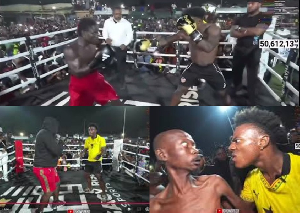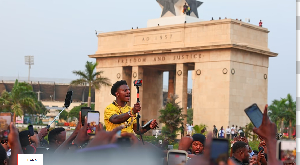The National Reconciliation Commission (NRC) set up to investigate past human rights abuses begins its public hearings today at the Old Parliament House. Close to three thousand complaints have already been received, out of which a hundred have already been investigated for hearing.
So far the details and identities of the complaints have been kept confidential, and from ADM's investigations, so would they remain until the commission tables them for hearing.
Of great interest to many people is whether the victims of the June 4 coup executions would have a place at the NRC. Until the petitions by the families to President Kufuor in 2001 for reburials, the families had remained by and large silent and resigned to the tragic and painful end of their loved ones.
ADM is reliably informed that some of the families of the executed former heads of state and senior army officers have petitioned the commission. A source at the NRC who disclosed this to ADM would not however divulge the details. The executed former military heads of state were Generals Afrifa, Acheampong, and Akuffo. The others, who were Service Commanders were Major General Kotei, Rear Admiral Amedome, Air Vice Marshal Boakye and Major General Utuka. Colonel Feli, though not a General or Service Commander, was added to the list of those executed.
The source said even though some of the families of the Generals have not petitioned the NRC, the commission has the mandate to initiate its own investigations.
The Director of the Public Affairs department of the NRC, Ms. Annie Anipa told ADM that the investigations and legal departments of the commission have served notice to victims and alleged perpetrators of past human rights violations to attend the hearings.
The executioners of the former heads of state and their colleagues have since the bloody acts advanced their own reasons for their actions. The NRC would finally put those reasons to the test.
A major "reason" given was that they were "guilty" of usurping state power, when their oath as soldiers was to defend the state.
For this reason, a retired former head of state, Lt. General Akwasi Amankwa Afrifa, who had long since left the military and had even subjected himself to constitutional elections for a seat in the 3rd Republican parliament and won, was abducted from his village in the Ashanti Region and subsequently shot.
In the case of Colonel Feli, it was said he was added to the list to make up the ethnic balance!
If the coup argument is advanced by the "defendants" at the NRC, a major constitutional conundrum would be created and would have to be settled one way or the other.
Ex-Flt. Lt. Rawlings, who was the chairman of the junta that "tried" and found Afrifa and the others guilty, himself went on to organize a coup against the 3rd Republic two years after the junta had handed power to the constitutionally elected government of the PNP under President Hilla Limann. After a decade as head of a military government, he converted himself into a quasi-civilian head of state and enjoyed another eight years of executive power in the 4th Republic.
The settlement of the executions of the three former military heads of state would go a long way to determine the legitimacy of Rawlings, first as Chairman of the PNDC, the body that overthrew the 3rd Republican constitution and secondly as the chief executive in the 4th Republic, which would determine whether in spirit, the 4th Republican constitution was not flawed from the very onset of its promulgation when as an unrepentant coup maker he manipulated the process and crowned himself president.
Lt. General Afrifa has now been reburied and that chapter is closed; the next chapter would be to determine what to do with his parliamentary seat, the seat he was denied when he was executed in 1979, ostensibly because of his role in the 1966 coup.












